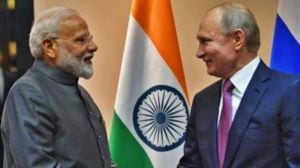Debate, or the moral police
It is almost Valentine’s Day but if you live in Mumbai, you could be excused for not remembering. In startling contrast to the hoopla o...

It is almost Valentine’s Day but if you live in Mumbai, you could be excused for not remembering. In startling contrast to the hoopla of the recent past over the annual lovefest, this year the celebrations appear somewhat muted. There are few ads for cosy dinners and theme parties. Product ads are aplenty but most talk of ‘eternal love’ and ‘passion’; one even invokes the legendary Majnu. The V word is conspicuous in its inconspicuousness. The reason for this sudden sobriety is not hard to find. Over the last few years the Shiv Sena has been conducting its typically virulent campaign against Valentine’s Day celebrations. That the efforts have snowballed is clear from a news report that claims that commercial establishments bowing to threats from the Shiv Sena, have decided to refrain from celebrating Valentine’s Day this year. What do we make of this?
Over the last decade there have been an unprecedented number of controversies of this nature such as the much publicised agitation against Deepa Mehta’s Water, the furore over Fashion TV and the periodic diktats on women’s apparel in various towns. In Mumbai, the country’s most open city, there have been processions against nudity, attempts to separate lovers by breaking up park benches, raids on nightclubs, protests against advertising campaigns and so on.
The logical liberal position would be to argue against the suppression of democratic rights by vigilante groups, the police and government agencies. Those who take this position also rightly claim that many of these purportedly moral campaigns are anti-women and a part of the thickening atmosphere of Hindu chauvinism in the country. Unfortunately this rigid compartmentalisation of people into those for and those against has prevented us from examining more closely the pattern formed by these recurring controversies.
The debate about public morality is of course hardly new. Some weeks ago even as the Mumbai police set off a hullabaloo by picking up and fining couples sprawled on the seafront (some claimed they had been merely talking), I came across a mention of Nehru chiding the governor of Bombay way back in the fifties for arresting a man and woman found kissing in public. I do not know if any account exists of the history of public morality in independent India, but there have been some exciting debates in the past: the first appearance of a swimsuit on the screen and celebrated scandals such as the Nanavati case or Roberto Rossellini’s elopement with a married Bengali woman provoked major conversations on appropriate behavior.
Arguably, though, the last decade has seen more change squeezed into a remarkably short time perhaps than ever before. Satellite television, the opening up of the economy and social mobility have brought new, unexpected and dramatic influences. These factors have also brought upheavals, excesses and imbalances. Some of the early indigenous soaps on satellite TV for instance were appallingly obscene and there are many who found the deliberate commercial exploitation of Valentine’s Day offensive. In many of the various cultural face-offs in recent times there is a sense of anxiety and of people trying to regain control over their lives.
Unfortunately we not debate things that bother us enough and let them slip into the hands of our self-appointed moral guardians, many of whom think nothing of using force to get their way. And while socio-cultural issues turn into civil rights issues the original stresses and contradictions continue as before. (What exactly was the Sena protest about? Was it against the flaunting of romantic inclinations? In which case it has its work cut out for the news is that young couples are manifesting their affections more openly than ever before. Was it against the concept of Valentine’s Day? Then what about the western habit of celebrating birthdays, that politicians from Mayawati to Vajpayee have no hesitation in adopting?)
Some years ago a few Muslim families in a suburban colony in Mumbai chose a rather dramatic form of protest. Provoked apparently by a rousing speech against the ill effects of television they simply chucked their TV sets out of their windows. A colleague with a British paper asked what I thought about it expecting me, I assume, to be critical of such a retrograde step. I told him that everybody was entitled to protest against what they considered an invasion of their cultural values. In fact, this form of protest seemed almost admirable in its voluntary opting for self denial.
Such Gandhian notions however are unlikely to find too many takers these days. And in the circumstances, perhaps what we need are fora where issues of public morality can be discussed informally and without prejudice. We may never find agreement but they might just help to wrest the initiative from the hands of political opportunists.
- 019 hours ago
- 029 hours ago
- 0310 hours ago
- 049 hours ago
- 0510 hours ago































